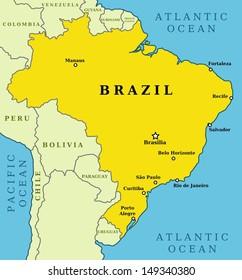Brazilian authorities have revealed that former President Jair Bolsonaro sought asylum in Argentina following his departure from office. According to police sources, Bolsonaro made attempts to secure refuge amid escalating political tensions and legal challenges in Brazil. This development sheds new light on the turbulent aftermath of Bolsonaro’s presidency and raises questions about the regional geopolitical implications of his potential exile.
Bolsonaro’s Asylum Request in Argentina Raises Diplomatic Tensions
Brazilian authorities have confirmed reports that former President Jair Bolsonaro sought political asylum in Argentina amid escalating legal challenges at home. According to statements from law enforcement sources, Bolsonaro dispatched emissaries in an attempt to negotiate safe passage and refuge, highlighting the increasingly strained political climate within Brazil. This move has ignited friction between the two South American neighbors, with Argentine officials yet to issue an official response to the asylum request.
The unfolding situation has raised key concerns regarding:
- Diplomatic protocol: The delicate handling of sovereign asylum claims without damaging bilateral relations.
- Regional security: Potential impacts on border controls and intelligence cooperation.
- Political precedent: The implications for other political figures facing prosecution.
| Aspect | Brazil’s Position | Argentina’s Stance |
|---|---|---|
| Official Acknowledgment | Confirmed ongoing investigation | No formal statement yet |
| Diplomatic Dialogue | Calls for discreet negotiations | Reportedly cautious and non-committal |
| Security Concerns | Heightened border scrutiny | Monitoring possible refugee influx |
Analysis of Political Implications for Brazil and Regional Stability
Recent revelations surrounding former President Jair Bolsonaro’s alleged attempt to seek asylum in Argentina have triggered significant concerns across Brazil’s political landscape and the wider South American region. The implications extend beyond mere legal proceedings, potentially exacerbating existing partisan divisions within Brazil’s electorate and political institutions. Bolsonaro’s maneuver is perceived by supporters as a strategic retreat to avoid prosecution, while opponents interpret it as an abdication of responsibility, intensifying debates about accountability and governance in Brazil’s democracy.
Moreover, this development poses challenges to regional stability by complicating diplomatic relations between Brazil and its neighbors. Argentina, under its current administration, faces a delicate balancing act between respecting international asylum protocols and managing domestic political optics. This scenario could influence:
- Cross-border cooperation on security and migration policies.
- Shifts in regional alliances within Mercosur and the Organization of American States (OAS).
- Public opinion regarding political asylum and accountability across Latin America.
| Aspect | Impact on Brazil | Impact on Regional Stability |
|---|---|---|
| Political Polarization | Increased tension between supporters and critics | Potential spillover of political conflicts |
| Diplomatic Relations | Strained ties with Argentina | Impact on Mercosur cohesion |
| Legal Precedents | Challenges to judicial independence | Pressure on asylum policies |
Recommendations for Handling Cross-Border Legal and Security Challenges
Effective management of cross-border legal and security issues requires proactive collaboration between neighboring countries’ law enforcement and judicial bodies. Establishing clear communication channels can prevent misunderstandings and ensure swift action when individuals seek refuge or asylum under contentious circumstances. Countries should prioritize diplomatic engagement to harmonize legal frameworks and respect each other’s sovereignty while upholding human rights and international law.
Key strategies include:
- Regular bilateral meetings focused on border security and extradition protocols
- Joint task forces for intelligence sharing on high-profile fugitives
- Developing standardized asylum procedures aligned with international conventions
- Utilizing technology to monitor potential cross-border movements and prevent illegal entries
| Approach | Benefit | Challenges | |||||||||||
|---|---|---|---|---|---|---|---|---|---|---|---|---|---|
| Bilateral Agreements | Streamlined extradition processes | Political tensions may delay negotiations | |||||||||||
| Joint Security Operations | Enhanced border monitoring | Coordination complexity across agencies | |||||||||||
| Standardized Asylum Policies | Consistent humanitarian treatment |
Effective management of cross-border legal and security issues requires proactive collaboration between neighboring countries’ law enforcement and judicial bodies. Establishing clear communication channels can prevent misunderstandings and ensure swift action when individuals seek refuge or asylum under contentious circumstances. Countries should prioritize diplomatic engagement to harmonize legal frameworks and respect each other’s sovereignty while upholding human rights and international law. Key strategies include:
|




